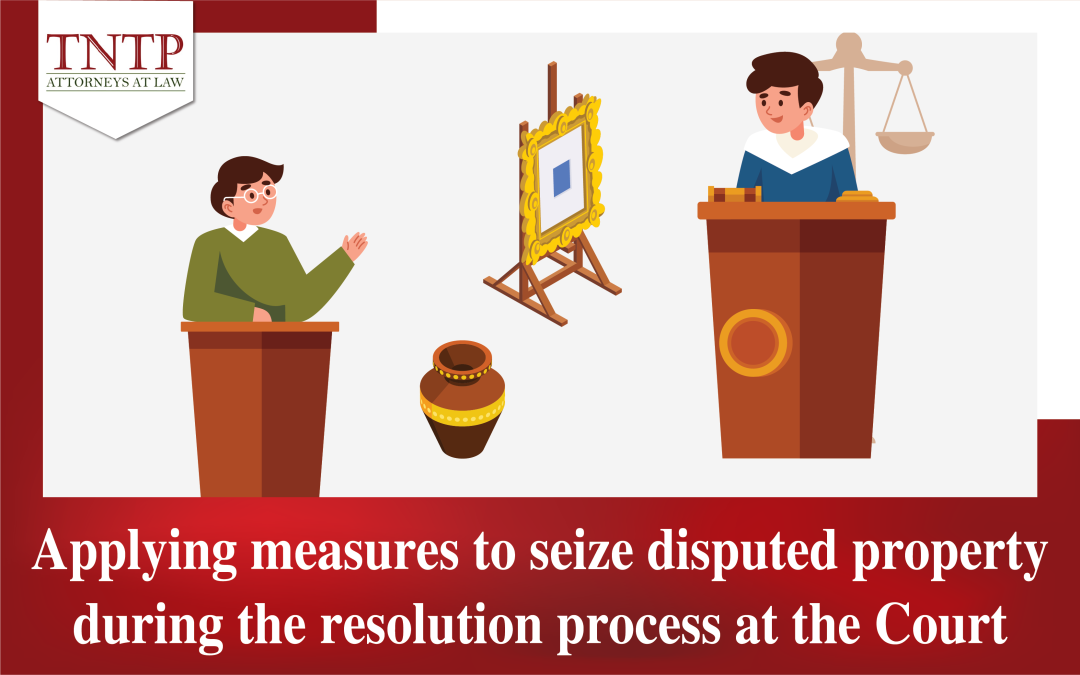The seizure of disputed property is one of the critical provisional emergency measures stipulated in Vietnam’s civil procedure law. This measure is implemented to prevent obligated parties from dissipating property or evading their obligations. In this article, TNTP will present several contents about applying measures to seize disputed property during dispute resolution in Court.
1. Seizure of disputed property
The measure of seizing disputed property is implemented to thoroughly inventory and analyze the assets involved in a case. This ensures a clear understanding of the property and prevents its transfer, dissipation, or destruction. It is applied when there is evidence that the party in possession of the property is attempting to avoid obligations by engaging in activities such as creating fake transactions, destroying the property, or taking actions that reduce its value.
The seized properties can be either movable estate or real estate. If the seized property is the movable estate, it may be confiscated and stored in the enforcement agency’s warehouse or entrusted to a third party for safekeeping until a Court decision is issued. For real estate, the property may be handed over to the litigants or a third party for management until the Court issues a decision.
2. Conditions for application
2.1 A request from the litigant or their representative
Similar to other provisional emergency measures, disputed property seizure is only applied upon the request of the litigant. This is practical because only the litigant is aware of the risks and can provide sufficient evidence to justify the necessity of seizing disputed properties to protect their legal rights and interests. Additionally, the Court’s decision to apply the measure based on the litigant’s request ensures that it is implemented objectively, fairly, and appropriately, avoiding unnecessary interventions that could harm the essential rights of the applied party.
2.2 The properties must be disputed property
This measure is not applied to all the properties of the litigant in a civil case but is limited to the properties involved in the dispute. Thus, the measure does not affect the entirety of the obligated party’s properties but only prevents the transfer, dissipation, or destruction of disputed properties within the case.
2.3 Evidence of asset dissipation or destruction is required
According to Clause 1, Article 120 of the 2015 Civil Procedure Code, this measure can only be applied when “there is evidence that the person holding the property is dissipating or destroying the disputed property”. Therefore, the Court may only decide to apply this measure when there is verified evidence that the person holding the disputed property has engaged in acts of dissipation or destruction of the disputed property. For example, the litigant provides photographs or videos recording the act of the property holder damaging the disputed property.
2.4 The requesting party must provide a security equivalent
To ensure that the petitioner held responsibility for their proposal and to minimize risks from this measure, the law requires the petitioner to fulfil a security measure equivalent to the value of the seized property unless the Court exempts this requirement.
3. In cases where the court does not apply the measure
Based on Clause 4, Article 4 of Resolution 02/2020/NQ-HDTP guiding the application of certain provisions on provisional emergency measures under the Civil Procedure Code, this measure is not applicable in the following cases:
– Property prohibited from circulation;
– Property serving the national defense, security, or public interest;
– Property meeting essential personal living needs, customary religious items, or necessary tools used for essential livelihood activities of the person subject to seizure;
– Property of businesses, cooperatives, or production, business, and service facilities used for healthcare, worker meals, or other essential services;
– Equipment, means, and property not used for business purposes by preschools, schools, and healthcare facilities;
– Equipment, means, and tools ensuring labour safety, fire prevention, environmental protection, etc.
This article by TNTP outlines the topic of “Applying measures to seize disputed property during the resolution process at the Court”. We hope it is helpful to our readers.
Best regards,







